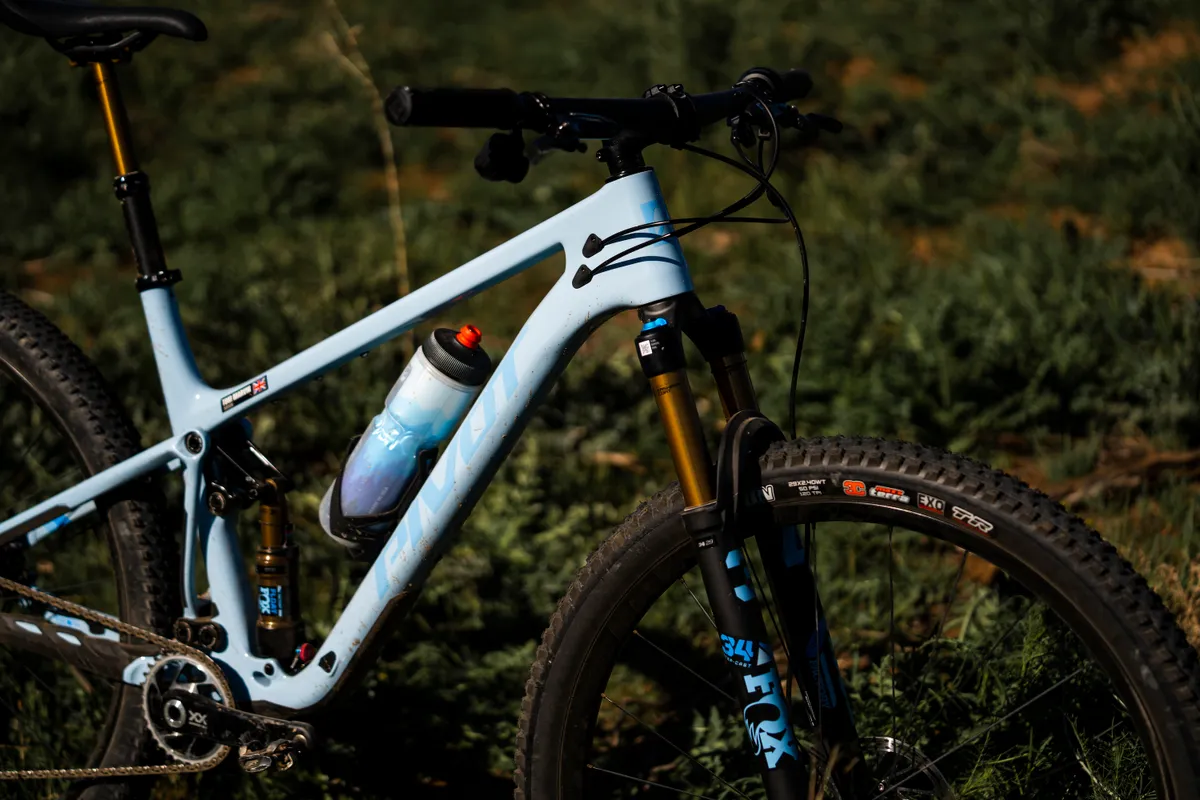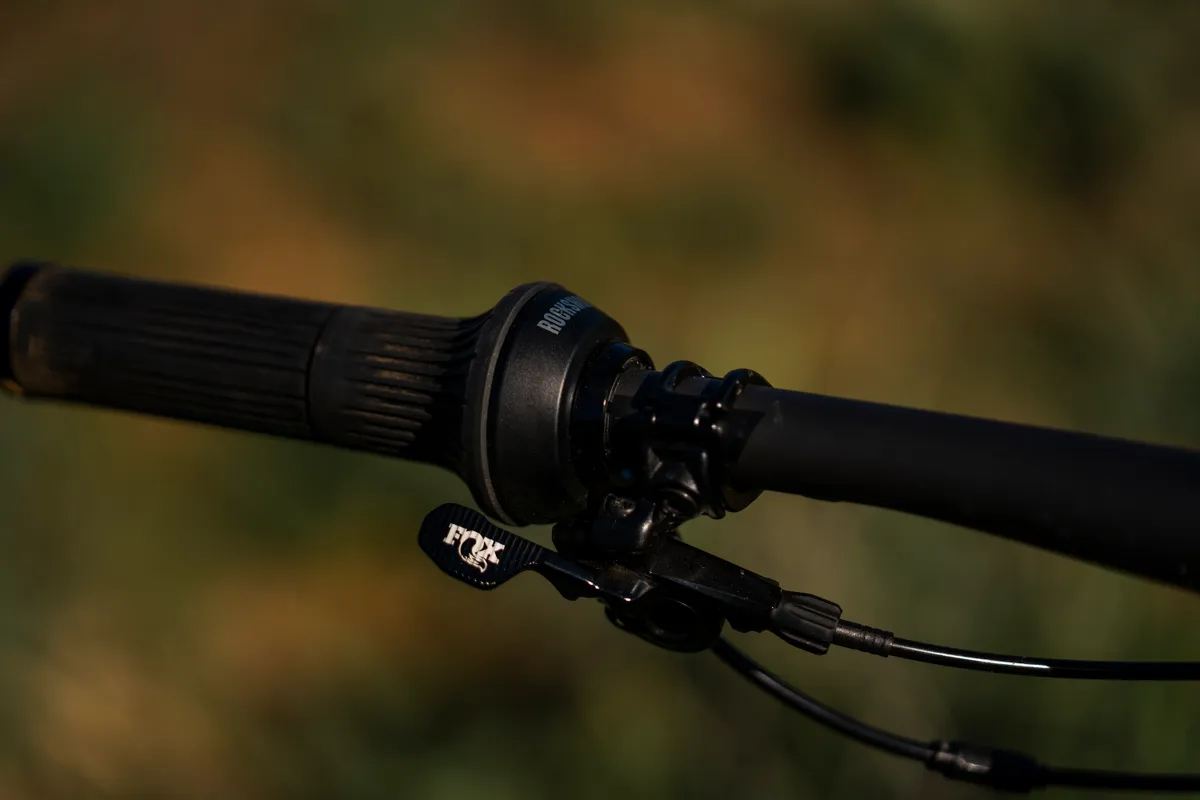The new Pivot Mach 4 SL is a race bike with a difference. Two travel options are available, and within those families, the frame has two travel settings.
Want to go super-light and punchy? The World Cup models may be for you. However, if technical trails are more your thing, the standard Mach 4 SL is the machine to go for.
While the World Cup bike gets 95mm or 103mm of rear-wheel travel and a Fox 32 StepCast fork with 100mm of bounce, the standard Mach 4 SL gets either 106mm or 115mm at the back, and a burlier 120mm Fox SC 34 up front.
During the bike's launch in Cortez, Colorado, I took the top-level, non-World Cup Mach 4 SL for a few days riding on the sun-blushed rocks and sand.
Pivot Mach 4 SL Team XX SL frame details
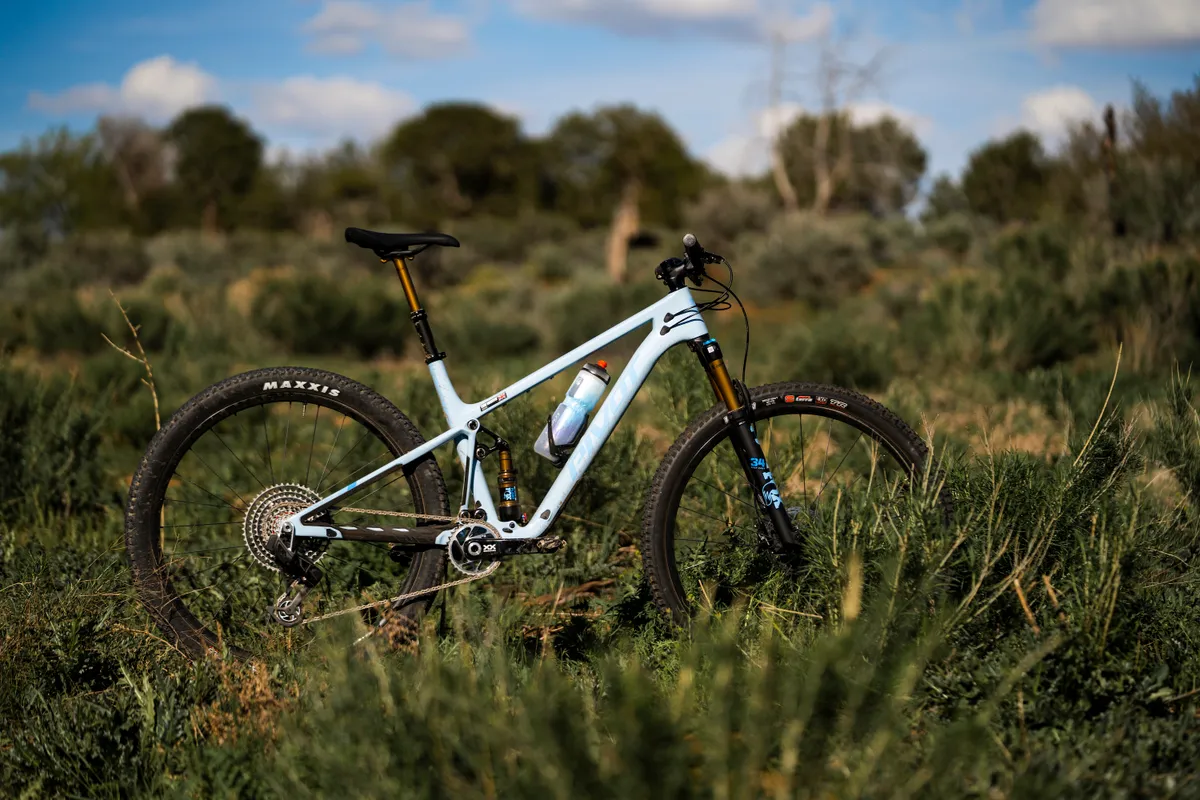
The Mach 4 SL uses Pivot's patented DW Link suspension, whereby solid front and rear triangles are joined by a pair of co-rotating 7000-series aluminium links.
Pivot decided to keep this linkage system because it was designed to remain efficient under higher pedalling loads. It separates braking forces from the suspension – keeping the rear wheel tracking while you're hauling on the brakes.
On this model, the bike gives either 106mm or 115mm travel, via a 45mm-stroke Fox Float shock. Swapping between travel options (which doesn't alter the bike's geometry) just requires the flipping of a chip in the rocker link – easy enough to do on the trail.
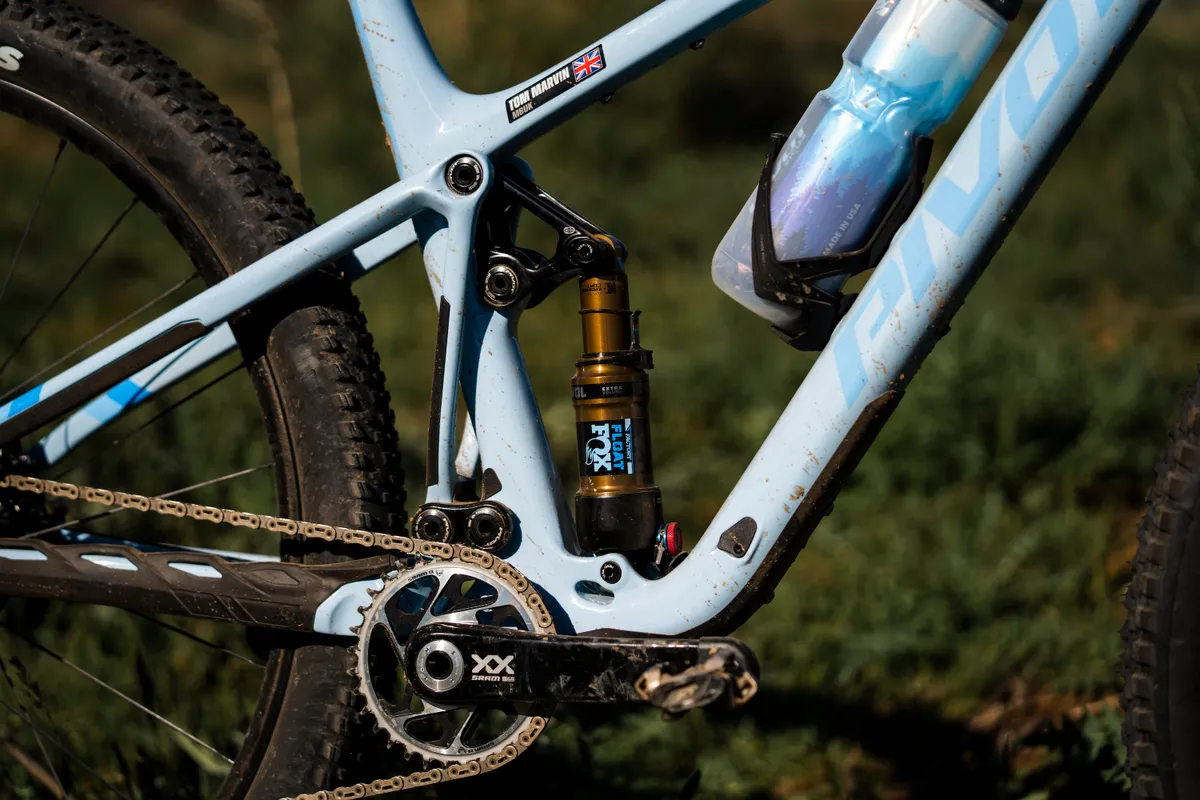
When I swapped it, there seemed no need to adjust shock pressures. The early leverage rate is similar between the travel modes, and so sag levels are pretty consistent.
The carbon frame is 300-400g lighter than the previous version of the bike, but Pivot says there's no change in stiffness.
There was room in my Large frame for a pair of water bottles, though I had only one cage, holding a large (insulated) bottle.
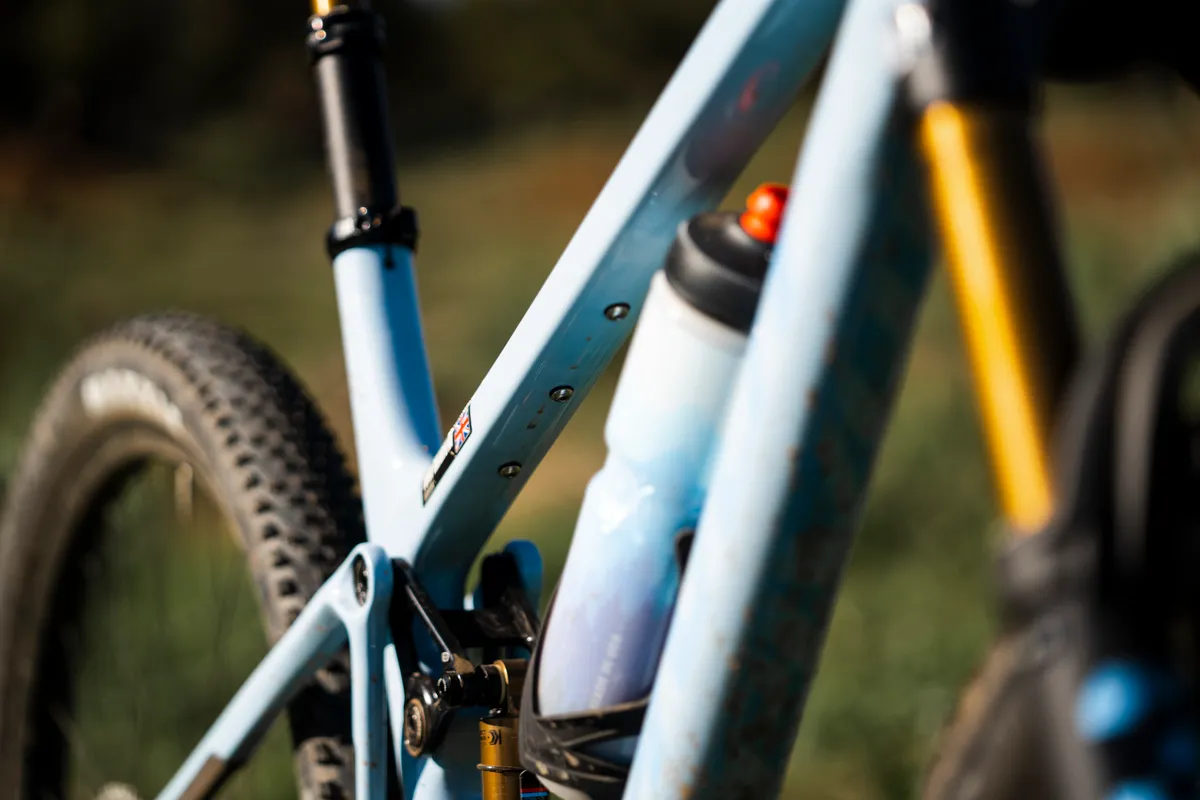
Chainstay protection is featured, as is a sheath over the internally routed cables to cut down on rattle.
Geometry on this bike is modern, without pushing boundaries.
The head angle sits at 66.7 degrees, while the reach is 462mm (the steeper, shorter-travel World Cup model has a longer reach).
The seat angle is listed at 74.7 degrees, while chainstays are 432mm long.
| | xs | SM | MD | LG | XL |
|---|---|---|---|---|---|
| Seat tube length (C-T) (mm) | 355 | 394 | 419 | 460 | 505 |
| Top tube length (Eff.) (mm) | 569 | 584 | 613 | 642 | 665 |
| Head tube length (mm) | 85 | 90 | 105 | 120 | 135 |
| Head tube angle (degrees) | 66.7 | 66.7 | 66.7 | 66.7 | 66.7 |
| Seat tube angle (Eff.) (mm) | 74.7 | 74.7 | 74.7 | 74.7 | 74.7 |
| Chainstay length (mm) | 432 | 432 | 432 | 432 | 432 |
| Bottom bracket height (mm) | 336 | 336 | 336 | 336 | 336 |
| Bottom bracket drop (mm) | 38 | 36 | 36 | 36 | 36 |
| Standover height (mm) | 646 | 656 | 684 | 679 | 709 |
| Wheelbase (mm) | 1,111 | 1,128 | 1,159 | 1,189 | 1,215 |
| Stack (mm) | 586 | 589 | 603 | 617 | 631 |
| Reach (mm) | 397 | 412 | 437 | 462 | 482 |
Pivot Mach 4 SL Team XX SL specification
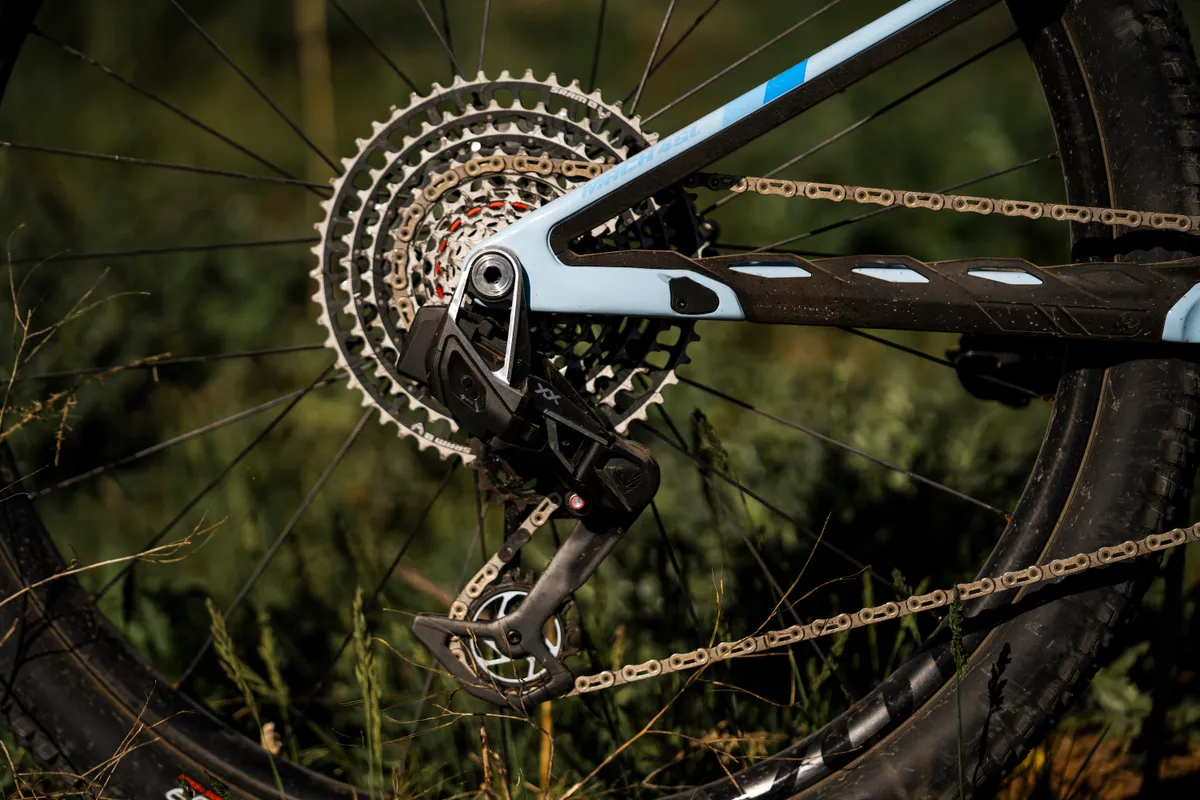
This is the top-end build, and so features some rather fancy kit. It's also the most expensive in the range, thanks to the use of SRAM's latest XX SL Transmission. A similar build with Shimano's XTR groupset is available too, for a lower price.
The bike sits on Fox Factory suspension – a 34 StepCast fork with 120mm travel and a Float rear shock. A SRAM TwistLoc remote flips the shock between Open and Firm modes.
SRAM's XX SL Transmission drives the bike forward, while SRAM Level Ultimate Stealth two-piston brakes provide the stopping power.
Reynolds' Blacklabel 309/289 wheels add some carbon bling, and Maxxis Rekon Race tyres, in a 2.4in width, sit on these (though, my test bike had the slightly more aggressive Rekon tyre fitted to the front).
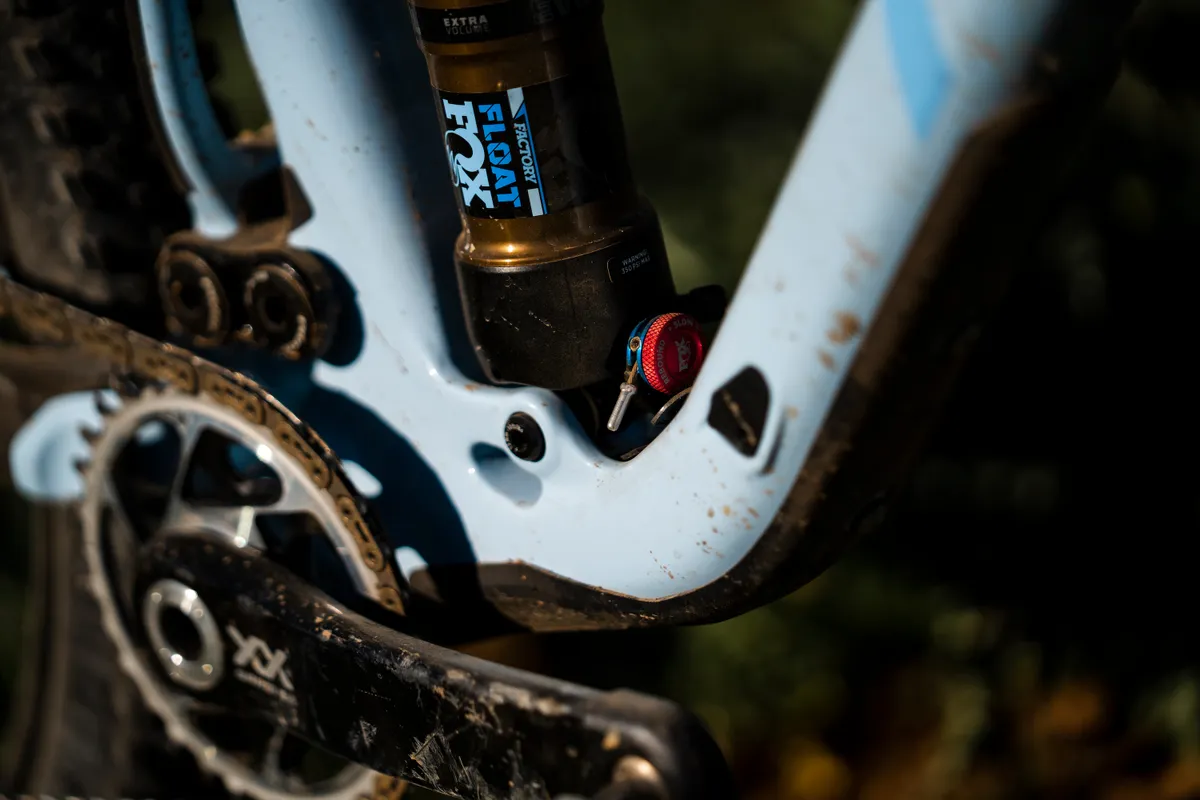
My test bike came with a Fox Transfer SL dropper, rather than the listed RockShox Reverb AXS.
The size-large bike weighed 11.3kg, without pedals.
Pivot Mach 4 SL Team XX SL ride impressions
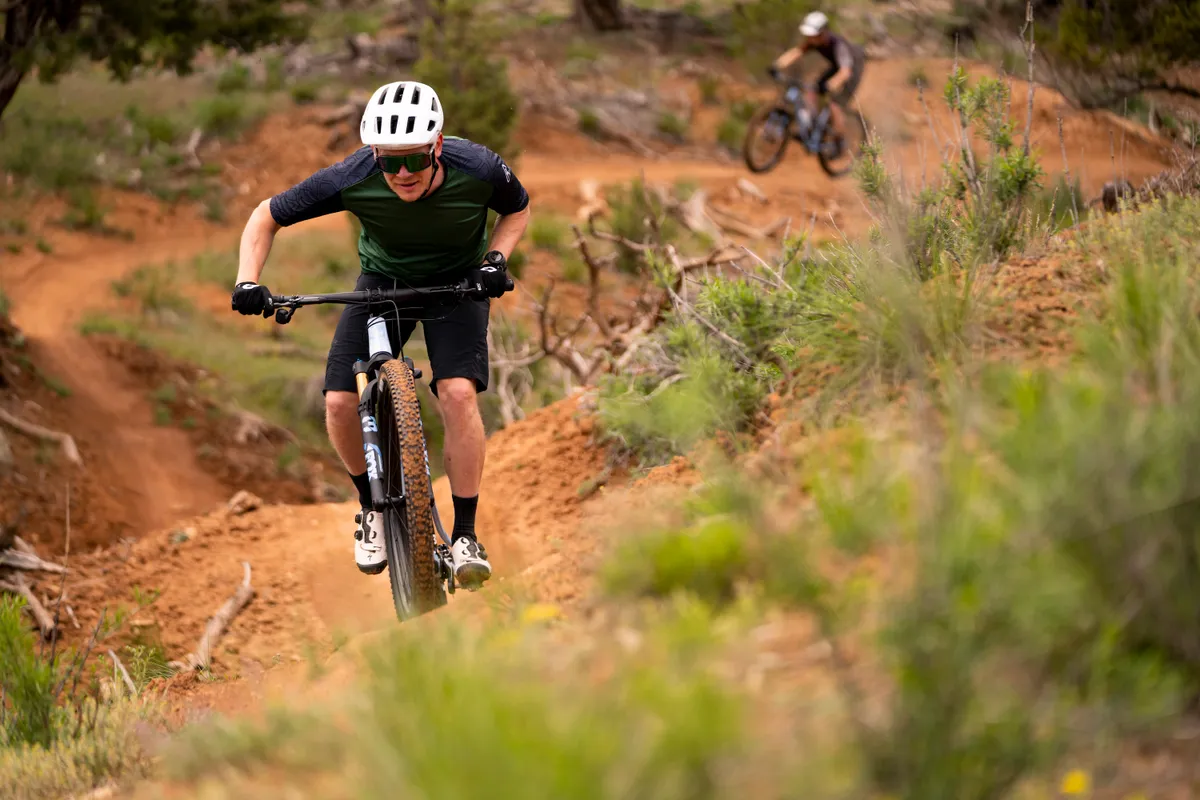
I rode the bike for two days on unfamiliar trails, and these are my initial impressions.
Pivot Mach 4 SL Team XX SL climbing performance
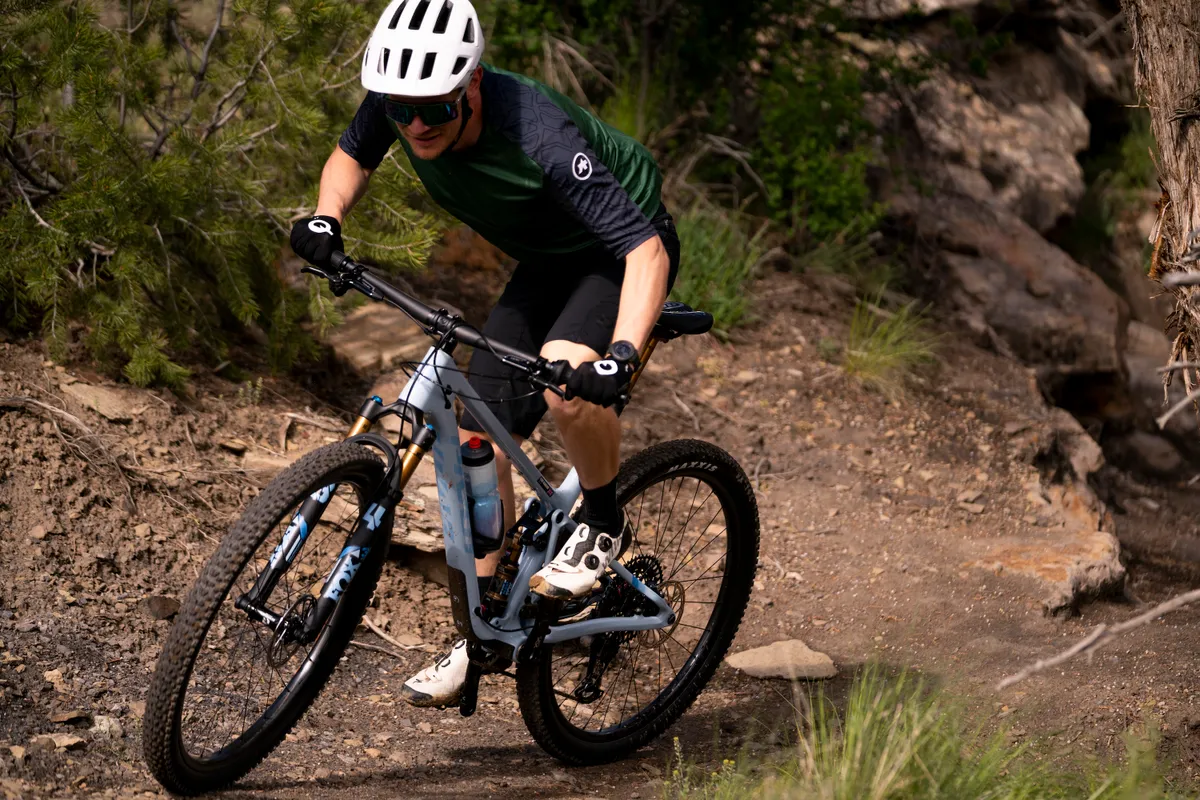
The Mach 4 SL has a very 'Pivot' feel that'll be familiar to anyone who's ridden one of the brand's bikes.
In the longer-travel setting, the suspension is stable under power, with only subtle movement under higher pedalling loads. At the same time, there's a reasonable amount of 'give' to soften the blow of roots and rocks on climbs.
Even on smooth drags, I never felt the need to twist the TwistLoc to lock out the rear shock. The bike simply never felt as if it was trying to rob me of power, and so I preferred to leave it fully open to maximise grip, were it to suddenly become short in supply.
In the shorter-travel setting, the whole bike firmed up, surprisingly so. It felt taught and even more direct out of the saddle. On bumpier climbs, there's less give in the system, so I found the bike bumped into steps a bit more – there's less give to soak up the edges.
Even so, you can then really muscle the bike up and over trail features, without it feeling soggy or unresponsive.
Traction is good in the long-travel mode. With the rear suspension stable, but not rigid, it helps the Rekon Race eke out as much grip as its shallow tread will ever offer.
Thankfully, the 2.4in tyres are mounted to wide rims, allowing low pressures (I ran 23psi at the back and 20 at the front).
The tyres have a 120 TPI carcass, too, which helps give them a really supple feel, further enhancing grip.
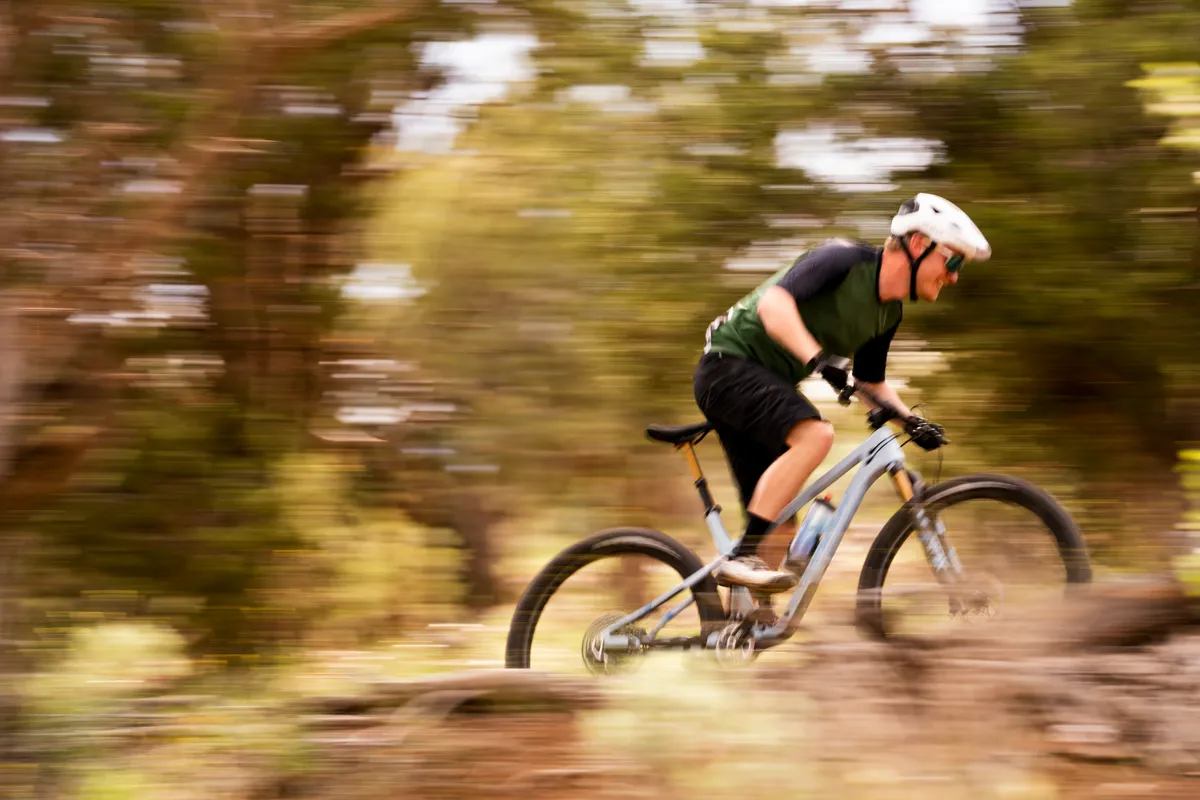
The tyres undoubtedly roll fast, with relatively closely packed, low-profile blocks rolling quickly on hard surfaces. In UK dirt, I'd probably want the slightly chunkier Rekon at the back, and in winter, even more tread.
In the shorter-travel mode, on softer surfaces, an injection of power will get the rear tyre spitting dirt.
I felt comfortable sitting on the bike for the duration of my test rides. The reach might not be the longest ever, but the 60mm stem helps with saddle-to-bar reach.
The seat angle isn't overly steep, but with the shock sat high in its travel, there's not so much sag to reduce the seat angle particularly far. I shunted the saddle forward in the post to get the angle as steep as it would go, largely out of personal preference.
Pivot Mach 4 SL Team XX SL descending performance
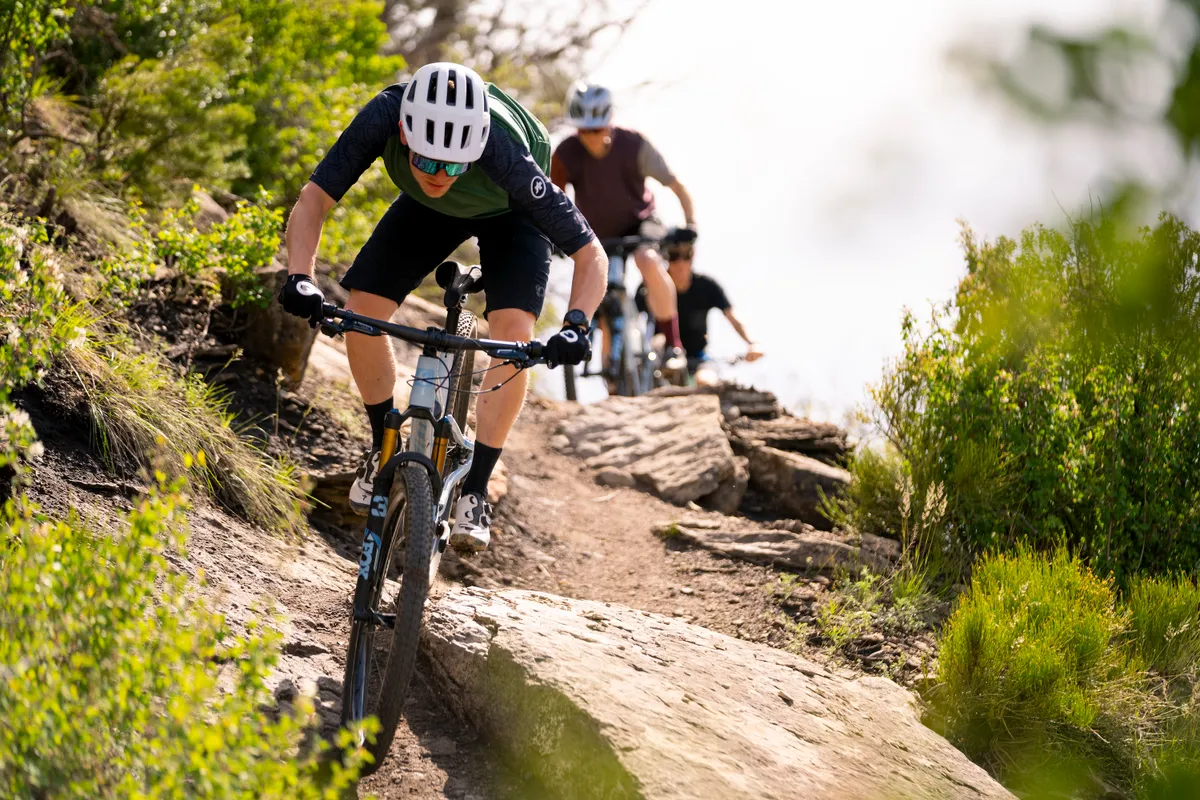
With 120mm of front travel and 115mm at the rear, the Mach 4 SL is at the upper end of cross-country bikes in the travel stakes.
I'm pretty on board with this, especially because the extra travel and stout nature of the Fox 34 adds relatively little in the weight department. The extra travel boosts capabilities, and the chassis of the fork is plenty stiff for most XC applications.
At the rear, the DW Link suspension is neutral. What I mean by this is it does its job quietly and without quirks or complaints.
Traction is good – I noticed no unnerving clunks as I moved through all the travel. There's ample support in the system so that if I wanted to lay down some power, the bike wasn't sinking into its travel unnecessarily.
Rockin' and rolling
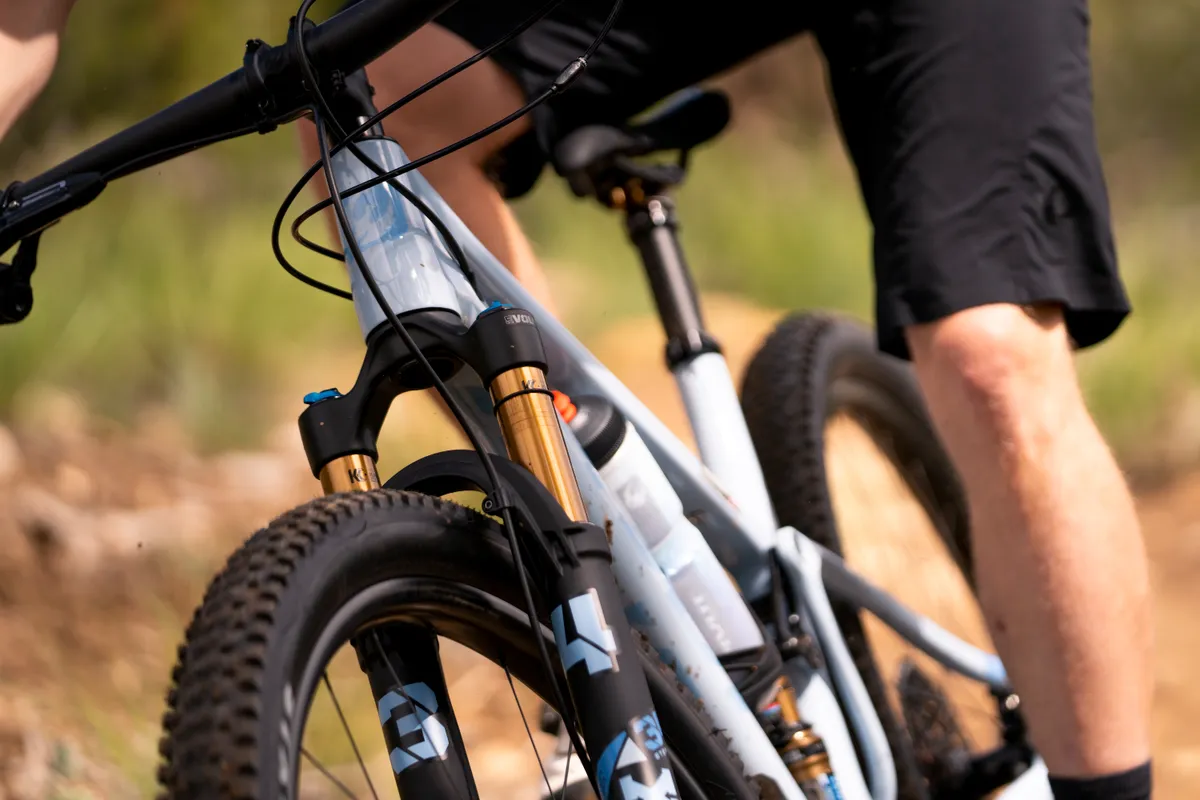
The terrain I tested the bike on was largely smooth and rolling, with plenty of opportunity to pump it through rollers and tip it into corners.
Here, it performed really well. It holds speed well, easily generating more if you want to push into the backside of a roller.
The Rekon I had fitted to the front of the bike is my favourite dry-weather cross-country tyre. Despite the fast-rolling tendencies, you can really trust it in a corner.
Occasionally, the trail provided rocky slabs, janky rolls and occasional drops.
The bike isn't as plush as the Orbea Oiz here, for example, with the rear end feeling firmer and more efficient overall. I used the lockout system on the Oiz quite a bit, but never on the Mach 4.
There is feedback through the rear end when you hit edges hard, or if you don't land a jump as smoothly as you'd like. It's not jarring, though, but this isn't a plush marshmallow of a bike.
Fortunately, the shape and travel on offer meant I didn't find the more technical sections of trail particularly overwhelming.
In its shorter-travel mode, it's a much stiffer machine. The ride is much firmer, with less forgiveness. Throw some watts into the mix and there's instant acceleration. Drop the bike over a lip and, while it deals with the impact, there's more of a thunk as you land.
It's a really different beast in this application – much more suited to aggressive efforts up punchy climbs.
The TwistLoc is almost redundant in my opinion – even in the longer-travel mode, I only twisted it to see what difference it made. Out on the trail, I don't think I'd bother.
In the shorter-travel mode, unless I was sprinting full-gas up a tarmac climb, it was totally unnecessary.
Twists and turns
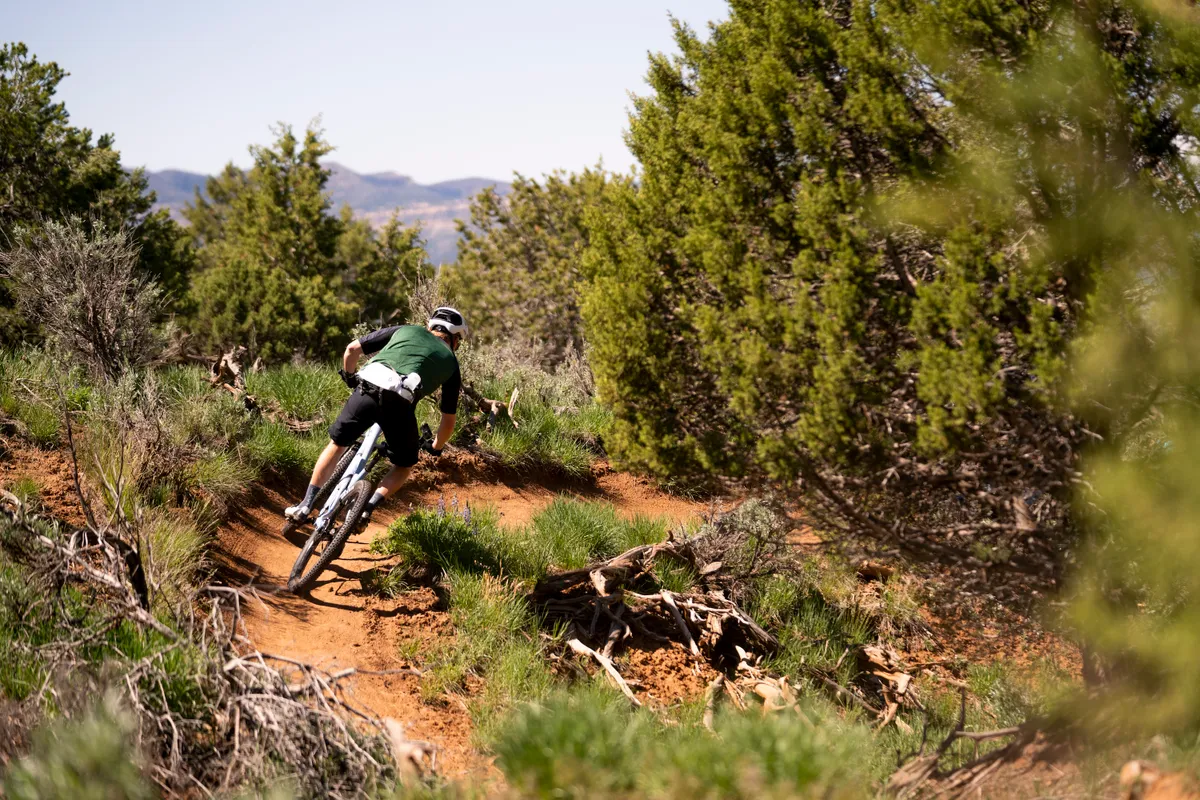
Handling-wise, Pivot seems to have nit the nail on the head.
The bike twists and turns with the best of them. It's happy dropping a shoulder into a corner, where the shoulder tread of the Rekon can dig in and bite.
Want to have a little fun? The front end lifts effortlessly, and it wasn't long into my test rides that I was swinging the rear wheel out round corners, or setting myself up for a berm with a Scandi-flick.
There's a chunk of support – part of why it pedals so well – so repeated rollers just invited a pull at the bars, and a doubling up of the trail's humps.
As a final point, while I rode the longer-travel version of the bike, there are also the World Cup models to consider, with 95 or 103mm travel, paired with a 100mm Fox 32 SC fork.
If the bike I rode is anything to go by, this should be an exceptionally fast XC race bike. With less travel, I'd expect the rear suspension to be even more efficient, and the Fox 32 SC is a good fork.
Pivot provides both front and rear remote suspension lockouts on this model, and it's designed for the most aggressive XC racers – think World Cup level stuff.
Pivot Mach 4 SL Team XX SL component details
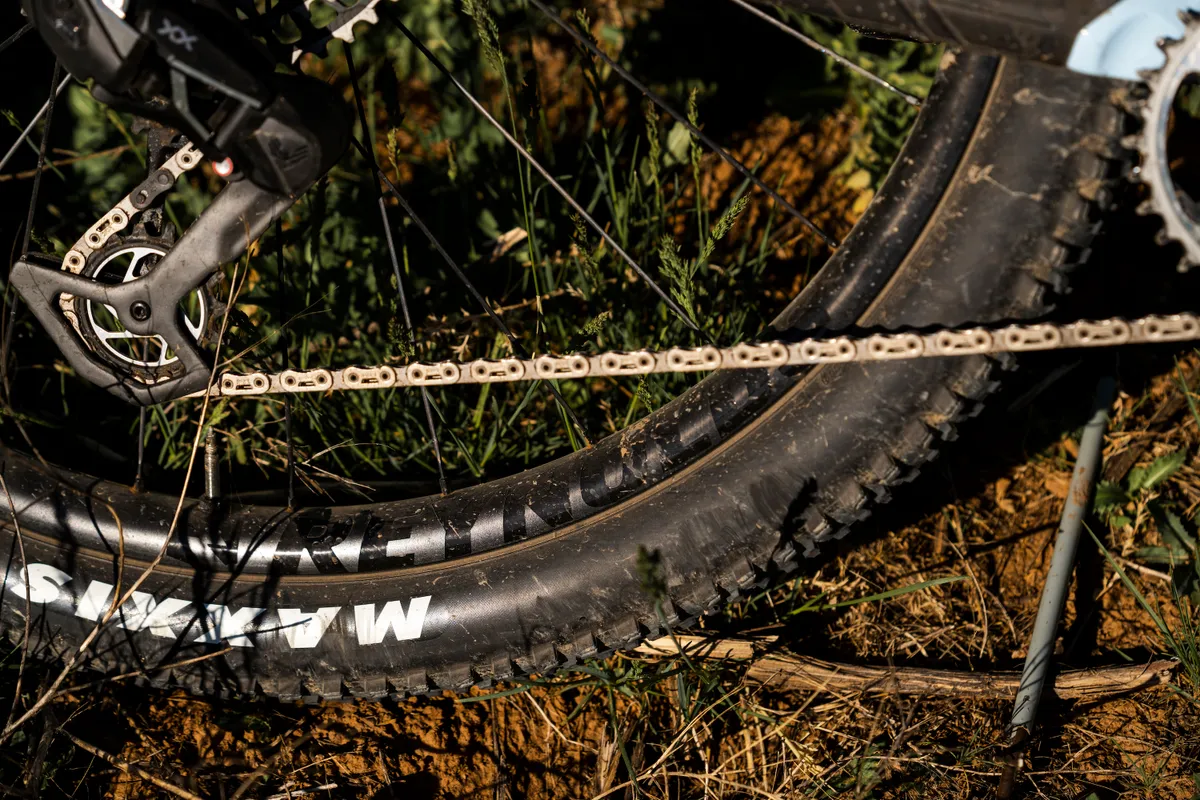
This model is undoubtedly dripping in top-end kit. On the whole, I was suitably impressed.
The Fit4 damper of the Fox SC 34 fork offers three compression modes, with adjustability of the Open mode too, to tweak the feel even more. It's a decent lighter-weight fork, which has a touch more authority than the lightest SC 32 or SID SL forks.
The Reynolds wheels are stiff under power, and in many ways suit the bike. Previous experience of Reynolds' wheels suggests they might be on the harsher side over the rocks, so I'd like to try this bike's setup on home trails to see whether this model is a touch more forgiving.
They offer a relatively broad bed to the (excellent) Maxxis Rekon Race (and Rekon on the front of my bike), enabling you to make the most of their 2.4in volume.
The XX SL transmission was interesting, on my first time riding it.
Shifting up and down the cassette is undoubtedly smooth, with the cassette's shift ramps working well with the flat-top chain.
However, thanks to the shifting gates, whereby the derailleur shifts when the cassette and chain are in optimum position, dumping a load of gears at once takes longer than with previous AXS drivetrains, or Shimano's XTR (which I rode on another bike during the trip).
This delay is noticeable, occasionally, on single shifts too, where it felt like up to half a crank revolution was completed before the shift. In a race situation, where, in my experience, you're less concerned with drivetrain longevity, the lethargic nature might frustrate.
I also struggled to get the shifter pods in quite the right place, with the MatchMaker mount.
I have an XX SL Transmission in for review, so I'll report back on that down the line.
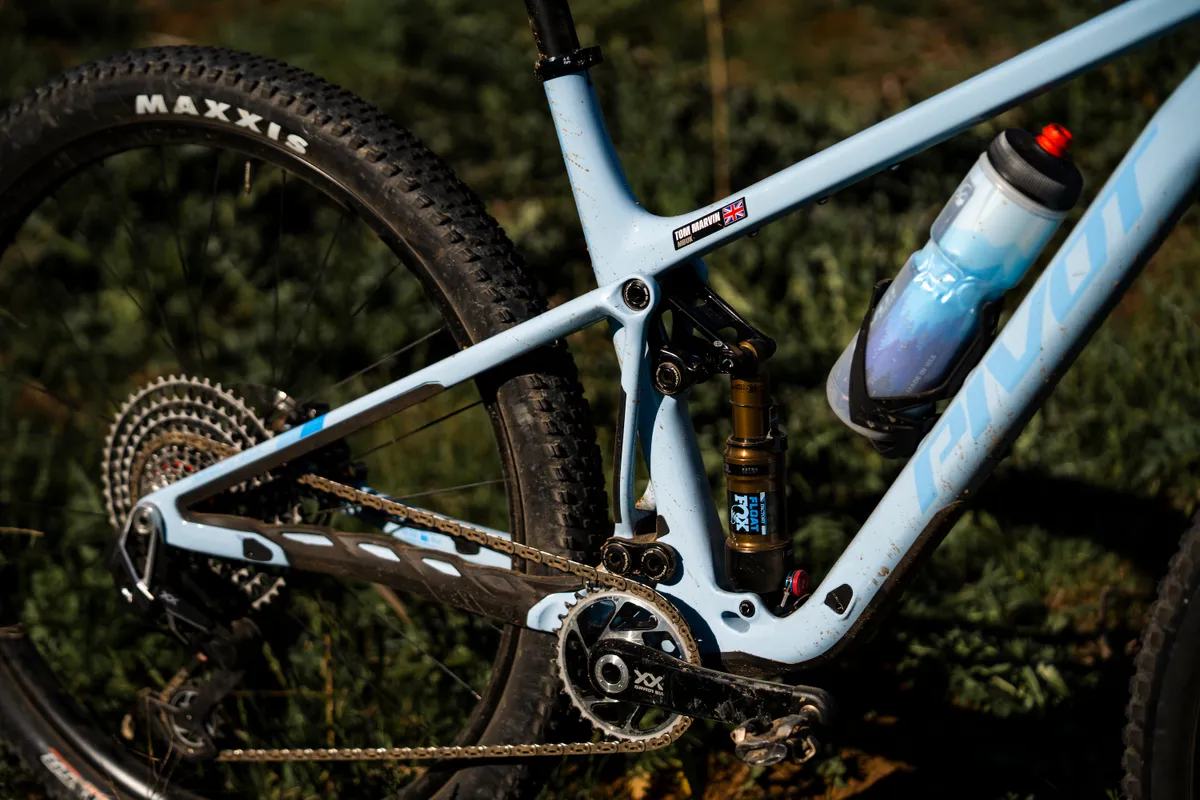
The SRAM Level Stealth brakes worked well during my tests. The 160mm rotors might be a touch small for heavier riders, or those who ride in steeper terrain, however.
Pivot's 35mm-diameter bar didn't feel overly harsh, and Fox's Transfer SL is a decent dropper (though isn't stock on this particular model).
Pivot Mach 4 SL Team XX SL bottom line
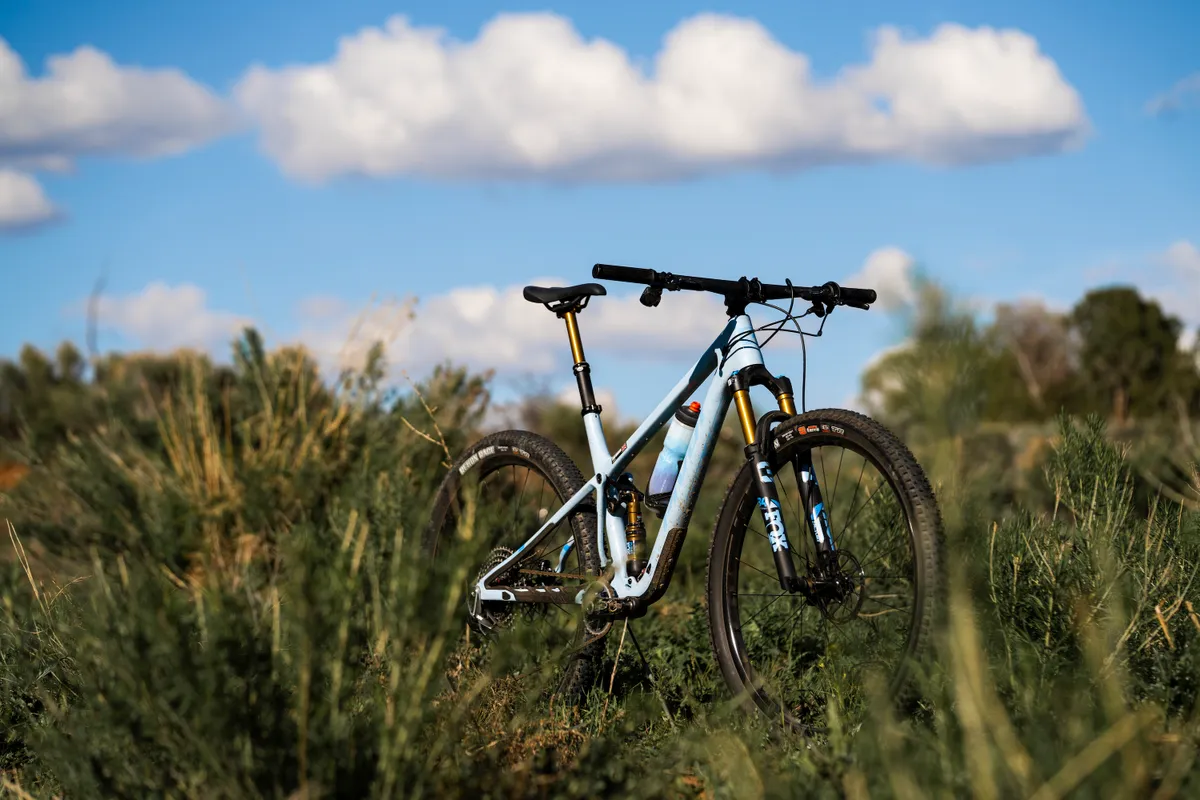
Based on my initial impression, Pivot has done a great job here.
In essence, the bike's neutral-feeling suspension pedals well, offers no surprises and doesn't hamper descending capabilities. The geometry is middle of the road, but perfectly adequate to deal with any XC situation, I feel.
The drivetrain works well, as does the finishing kit. The suspension dampers all felt great, and the tyres are spot-on for dry, rocky terrain.
Product
| Brand | pivot |
| Price | 12500.00 GBP,11599.00 USD |
| Weight | 11.2300, KILOGRAM (Large) - without pedals |
Features
| Fork | Fox Factory 34 StepCast |
| br_stem | Phoenix Team XC/Trail 60mm |
| br_chain | SRAM XX SL |
| br_frame | Carbon fibre, 115/103mm travel |
| Tyres | Maxxis Rekon Race TR EXO 29x2.4” |
| br_brakes | SRAM Level Ultimate Stealth, 160/160mm rotors |
| br_saddle | Phoenix WTB Volt (Narrow Width) - Carbon rails |
| br_wheels | Reynolds Blacklabel 309/289 XC w/ Industry Nine Hydra hub |
| br_shifter | SRAM XX SL |
| br_cassette | SRAM XX SL |
| br_seatpost | Rock Shox Reverb AXS |
| br_gripsTape | SRAM TwistLoc |
| br_handlebar | Phoenix Team Flat Carbon, 760mm |
| br_rearShock | Fox Factory Float |
| br_bottomBracket | SRAM DUB |
| br_availableSizes | XS, S, M, L*, XL |
| br_rearDerailleur | SRAM XX SL |
